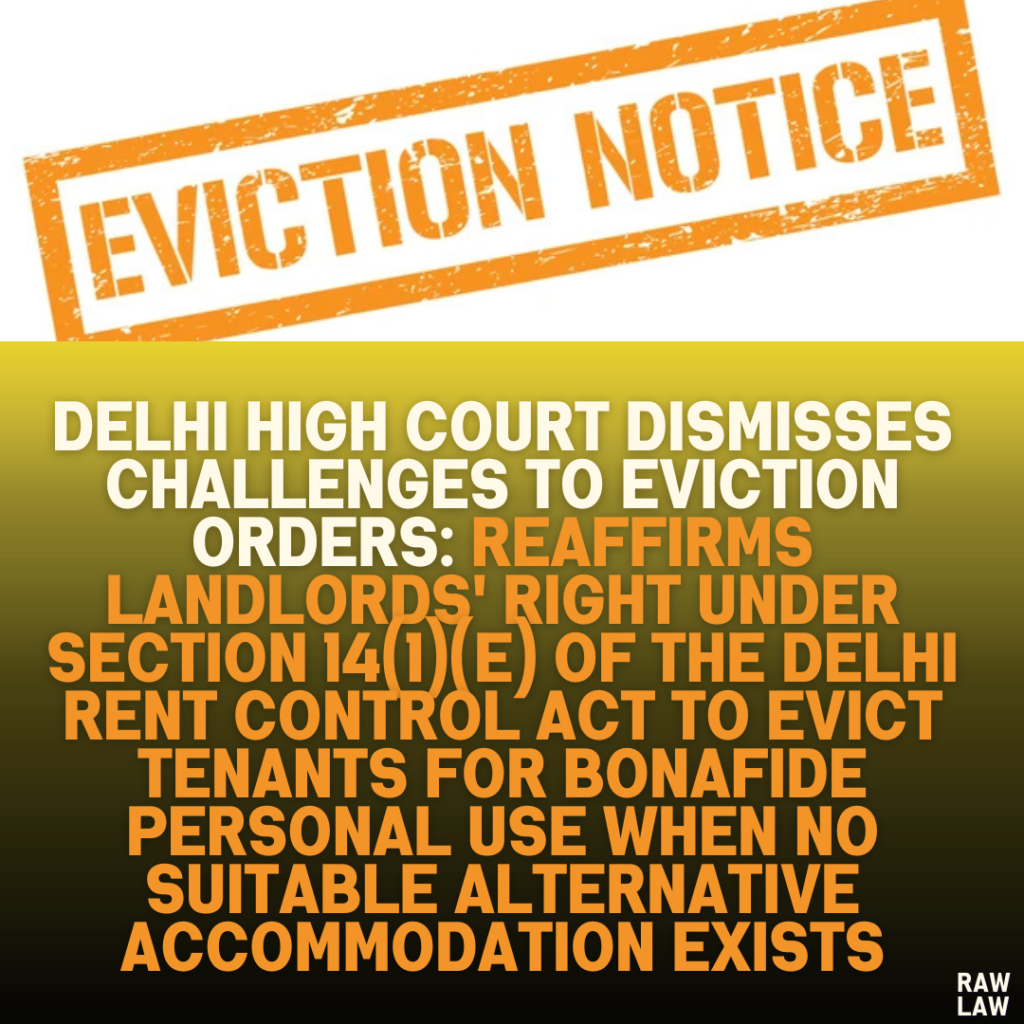Court’s Decision
The Delhi High Court upheld the eviction orders passed by the Additional Rent Controller (ARC). It affirmed the landlords’ bonafide requirement for the premises for residential and commercial purposes and rejected the tenants’ and sub-tenants’ arguments that the eviction petitions were invalid. The court dismissed the revision petitions under Section 25B(8) of the Delhi Rent Control Act (DRC Act) and upheld the ARC’s orders.
Facts
- The landlords filed eviction petitions under Section 14(1)(e) of the DRC Act, claiming the premises located in Naya Bazar, Delhi, were required for residential use by family members and for commercial purposes to start transport businesses.
- The landlords stated that portions of the premises were illegally sublet by the original tenant to sub-tenants without their consent.
- The premises comprised multiple floors, and the landlords highlighted their lack of suitable alternative accommodations in Delhi to justify the eviction.
- The tenants and sub-tenants contested the eviction orders, claiming the petitions were not maintainable and the landlords lacked bonafide intent.
Issues Addressed by the Court
- Can eviction petitions under Section 14(1)(e) be filed against sub-tenants?
- Did the landlords have a genuine need for the premises?
- Was there suitable alternative accommodation available to the landlords?
Petitioner’s Arguments (Tenants/Sub-Tenants)
- Improper Use of Law:
- Sub-tenants cannot be evicted under Section 14(1)(e). They argued that such proceedings could only target tenants, making the petitions invalid.
- They cited precedents, including Siri Pal Jain v. Brij Kishore, to claim the ARC had erred in applying this section to sub-tenants.
- No Bonafide Requirement:
- The landlords had ulterior motives to evict the tenants and sub-tenants to sell or lease the property at a higher price.
- They highlighted that portions of the premises were already in the landlords’ possession and remained unused, negating the need for eviction.
- Alternative Accommodation Available:
- The landlords had other properties and accommodations available in Delhi, including parts of the premises that were already vacated.
- Procedural Irregularities:
- The sub-tenants argued they were not given adequate notice or opportunity to defend themselves.
Respondent’s Arguments (Landlords)
- Bonafide Need for Residential and Commercial Use:
- The landlords needed the premises for family members residing in rented accommodations.
- They required space to start transport businesses, as existing premises in Amritsar were insufficient.
- Legal Validity of Eviction Petitions:
- Under Section 2(l) of the DRC Act, “tenants” include sub-tenants, making the eviction petitions legally valid.
- The landlords argued that sub-tenants were given opportunities to contest the petitions by filing leave-to-defend applications.
- No Suitable Alternative Accommodation:
- The landlords emphasized that no suitable alternative properties were available for their needs in Delhi.
- Deficiencies in Petitioners’ Claims:
- The tenants failed to substantiate their claims about the availability of alternative accommodations or improper use of the premises.
Analysis of the Law
- Section 14(1)(e) of the DRC Act:
- Allows landlords to evict tenants if the premises are required for bonafide personal use, and no suitable alternative accommodation exists.
- The court noted that sub-tenants are included under the definition of “tenant” (Section 2(l) of the Act), allowing eviction petitions against them.
- Scope of Revisional Jurisdiction:
- Under Section 25B(8), the High Court’s revisional jurisdiction is limited to ensuring the ARC’s order complies with the law. It cannot re-appreciate evidence or act as an appellate court.
- Precedents like Shiv Sarup Gupta v. Mahesh Chand Gupta were cited to highlight the limited scope of review.
- Presumption of Bonafide Requirement:
- Citing Sarla Ahuja v. United India Insurance Co. Ltd., the court held that the landlord’s assertion of bonafide need must be presumed valid unless disproven by the tenant.
Precedent Analysis
- The court distinguished this case from Siri Pal Jain v. Brij Kishore, where sub-tenants were not allowed to defend themselves. In contrast, the sub-tenants here were given opportunities to file leave-to-defend applications.
- It relied on Shiv Sarup Gupta and Sarla Ahuja to affirm the ARC’s findings.
Court’s Reasoning
- Bonafide Requirement Established:
- The landlords provided sufficient evidence of their need for the premises for both residential and commercial purposes.
- The desire to start transport businesses in Delhi and avoid paying high rent for family members’ accommodations was deemed reasonable.
- Inclusion of Sub-Tenants in Petitions:
- The court held that sub-tenants were rightly included in the eviction petitions since they fell under the DRC Act’s definition of “tenant.”
- Lack of Suitable Alternative Accommodation:
- The landlords demonstrated that no alternative premises were available to meet their needs.
- The court rejected the tenants’ claims of unused portions, ruling that the landlords had discretion over the utilization of their property.
Conclusion
The Delhi High Court dismissed the revision petitions, affirming the eviction orders under Section 14(1)(e) of the DRC Act. It upheld the ARC’s findings that the landlords had a bonafide requirement for the premises and no suitable alternative accommodation was available.
Implications
- Clarification on Sub-Tenants’ Eviction:
- The judgment establishes that sub-tenants can be evicted under Section 14(1)(e), provided they are included in the eviction petitions.
- Deference to Landlords’ Judgment:
- Reinforces the principle that landlords are the best judges of their needs and how to utilize their properties.
- Limited Scope of Review:
- Affirms that revisional jurisdiction under Section 25B(8) is confined to procedural and legal compliance, not re-appreciation of evidence.
By dismissing the revision petitions, the judgment reinforces landlords’ rights under the DRC Act while emphasizing procedural safeguards for tenants and sub-tenants.




Pingback: Delhi High Court Overturns Conviction Under POCSO Act and IPC, Citing Procedural Lapses, Contradictory Testimonies, and Defective Examination Under Section 313 CrPC - Raw Law